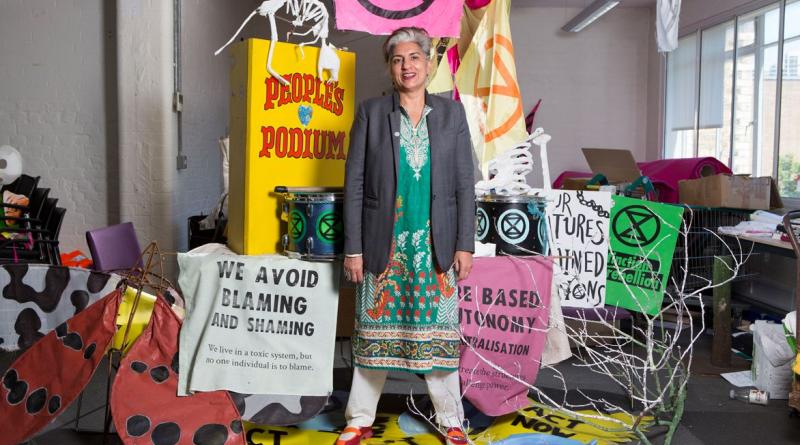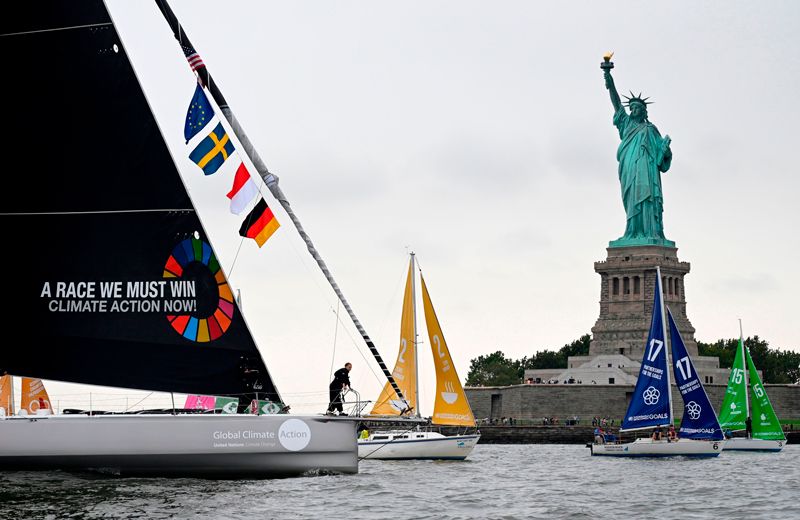Why I broke the law for climate change.

Lawyer Farhana Yamin explains what drove her to civil disobedience after three decades of environmental advocacy for the IPCC, the United Nations and more.
On 16 April this year, I superglued my hands to the pavement outside the headquarters of the oil company Shell in London, surrounded by dozens of policemen. Once unstuck, I was arrested for causing criminal damage. I have been a lead author for the Intergovernmental Panel on Climate Change (IPCC) for three of its five assessment reports, and an adviser in the United Nations climate negotiations for almost 30 years.
Why did I, an international environmental lawyer, break the law? Having spent three decades failing to get governments to pay attention to the climate crisis through advocacy at the highest levels, I felt that activism was now crucial. I wanted to show how ridiculous it is that a law-abiding (indeed, law-making) mother of four should be handcuffed while the world’s major polluters remain unaccountable for ecocide.
My arrest was part of a wave of peaceful protests against the UK government in April 2019, organized by the global movement Extinction Rebellion, or XR. It uses non-violent civil disobedience to demand radical action to tackle what many of us now refer to as the climate emergency.
Until June this year, I coordinated XR’s political strategy team. My role was to find ways to build momentum across the party spectrum and organize negotiations with government. I’ve now returned to my profession: helping governments of developing and developed countries to implement commitments under treaties such as the 2015 Paris climate agreement, and through national laws that have created carbon markets. I will focus on providing legal assistance to vulnerable communities, advising them on how they can enhance ambition in the run-up to the next round of Paris agreement negotiations in Glasgow, UK, in December 2020.
Such treaties and laws provide a crucial framework for action. But sadly, weak legislation and tweaks to ‘business as usual’ practices have not prevented environmental devastation. The current form of capitalism is toxic for life on Earth. It is based on the never-ending extraction of nature and an unjust appropriation of resources that belong to historically marginalized communities. In their current forms, green taxes and tradeable carbon permits let polluters pay to play the same old games.
The global economy must be fundamentally reconfigured into a circular system that uses fewer resources and is based on renewable technologies. The time for half measures has run out — as made plain by the 2018 IPCC special report on the impacts of a 1.5 °C rise in global average temperatures. That’s why I chose to get arrested.
By now you might have labelled me an extremist, here to boast about her mid-life flirtation with the barricades. Talk of injustice, devastation, emergency and the need for radical change is far removed from the neutral vocabulary used by the scientific community in journals such asNature. But these seemingly emotional terms now fit the facts — and they effect change. I’d rather be labelled ideological than mislead the public into complacency.
Many of my climate colleagues were surprised when I became an activist. But since my arrest, they have applauded what I, and thousands of fellow rebels, did in shifting the political discourse (see ‘Advice for potential activists’). Many others still question whether disruptive, mass civil disobedience is really necessary.
I believe it was, and remains so. In large part, this is because it is producing the sorts of positive rapid result I could only dream of in my years of committee-sitting and draft-wrangling.
Disruptive force
Representatives of UK political parties on all sides congratulated XR for its festival-like actions that shut down large parts of central London for ten days in April. In a few months, XR put the need for global system change on the political map at the highest levels, confounding its detractors. In the United Kingdom, where XR was founded and is strongest, public support for climate action is now at record levels.
XR’s political strategy team met separately with the UK government, the Mayor of London and the opposition Labour Party. On 1 May, Parliament passed a non-legally binding emergency motion that recognized the climate crisis. A month later, it legislated a legally binding target of net zero greenhouse-gas emissions by 2050, making the United Kingdom one of the first countries to do so. The date is nowhere near soon enough, but this fast-tracking would never have happened without XR’s disruptive protests and the global student strikes on which they built, led by campaigner Greta Thunberg.
We need to value scientists and negotiators for the work they do. But we also need sustained, widespread, peaceful disruption and direct action. Collectively, governments are way off their Paris commitments to keep temperatures well below 2 °C. We need to try a diversity of new tactics.
The old forms of campaigning and advocacy aren’t working fast enough. Earth Day began in 1970, when millions of Americans took over streets and campuses across the United States. The IPCC’s First Assessment Report was published in 1990; governments adopted the UN Framework Convention on Climate Change in 1992 and the Kyoto Protocol in 1997. It took four more IPCC assessments to get to the Paris agreement. Is it any wonder that frustration is mounting?
Youth protest
Students are leading the charge, calling young people and adults to join a global climate strike. This is planned for 20 September, a few days ahead of a crucial UN summit in New York City, convened by UN secretary-general António Guterres. He wants leaders to bring new climate commitments to close the vast ambition gap. The strike is expected to draw millions of people worldwide. I hope that scientists will give up their valuable work for at least half a day.

XR is planning a second International Rebellion in key cities worldwide, starting on 7 October. The UK government is not on track to meet its current legal obligations to cut emissions under the 2008 Climate Change Act. (It still subsidizes fossil-fuel production and supports carbon-intensive investments in infrastructure, such as for a third runway at Heathrow airport.)
In the United States, the global Green New Deal (GND) movement is gaining traction. It is supported by US senators Alexandria Ocasio-Cortez (Democrat, New York) and Bernie Sanders (Democrat, Vermont), as well as the youth movements Zero Hour and Sunrise, which share XR’s demand for a break with current politics. The GND seeks an approach to rapid decarbonization that is based on social justice, through the use of renewable energy, clean-air technologies, community resilience and prioritization of historically marginalized communities.
These campaigns can only succeed if more people join in — including professionals, such as scientists. It is harder to dismiss protests that have a broad base of support. Long-sought change can come about unexpectedly quickly under the right conditions, as exemplified by the downfall of apartheid and communism, or by more mundane shifts as happened with norms over public smoking in several countries.
Understandably, many professionals are wary of endorsing campaigns, let alone taking direct action. I still share some of their trepidation. Being an activist can be emotionally and physically draining, requiring long meetings and careful coordination of strategies, tactics and systems of support. But the same can be said of working on UN negotiations: I’ve lost count of the number of all-night meetings I’ve attended, with some negotiations turning into 48-hour marathons.
Plus, activists can risk their lives, as so many do in highly illiberal nations. And being an activist can threaten livelihoods: in law, as in science, a person’s credibility rests on perceived impartiality built through offering knowledge and advice in the form of books, peer-reviewed articles, policy reports and expert testimony. Not glue and placards.
For all these reasons, I anguished for a long time before taking the plunge from academia.
Deeds not words
The trigger for my leap into activism was the release in October 2018 of the IPCC’s grim special report comparing the impacts of a 1.5 °C change in global average temperatures with higher rises. It landed during a time of personal, political and professional despair, brought about by bereavement, burnout, Brexit, Trump’s withdrawal from the Paris agreement, and more.
For so long, I’d trusted that government actions are essentially evidence-based, and that our ‘normal’ electoral cycles are messy but ultimately safeguard long-term national and planetary interests. Like every other scholar, I’d churned out papers and policy reports in the hope that these would be used by campaigners and heeded by politicians.
On behalf of the small island states, I had worked since 2008 to get the UN climate negotiations to acknowledge that a 2 °C rise was too dangerous, and that it needed to enshrine the 1.5 °C threshold demanded by the world’s most vulnerable countries and ecosystems. Still emissions rise; still the rhetoric is “well below 2 °C”?
Galvanized, I could no longer ignore what all my legal writing and advising was not changing. The few politicians who want to alter the status quo are blocked because systems are dominated by vested interests and inertia. For example, the top five oil companies have together spent US$1 billion on influencing public and political opinion since the Paris agreement, according to a report by InfluenceMap. Just 3% of their combined $115 billion of capital investments in 2019 will go to low-carbon options (see go.nature.com/2m8pja3).
Rethink and reset
What we need is not system change or personal change — it’s both. Not street circus or government and industrial overhaul, but both. Not reform through revolution or the ballot box. Both.
The climate emergency we face now requires every one of us to question how we compartmentalize our professional, personal and political choices. That means acting differently in all three spheres and rethinking how to become audacious leaders in all aspects of our lives. Climate devastation demands us to be upstanders, not bystanders.
The era when we limited our jobs to researching, writing, presenting and throwing our reports over the ‘policy fence’, leaving it to campaigners and activists to implement their conclusions, is over. Is working in silos and factions and fretting only about tenure, citations and the next research grant really the best we can do? Professionalism and impartiality must not require us to be indifferent to the fate of the world.
The two biggest global injustices in human history are unfolding in our lifetimes. One is how we treat poor people who are on the front line of ecological destruction, such as those living in the Amazon. The other is how we treat our young people. In both cases, a privileged few are leaving a massive burden of irreversible change, destabilization and possible collapse of food and agricultural systems with attendant social and psychological breakdown.
It is easier to say all these things now that I am 54 years old with considerable capital — economic, social and reputational. These give me the freedom to speak out, as a lawyer, an activist and a mother. Like all parents, I’ll do whatever it takes to keep my children safe. Right now, that means rebelling against a way of being that is destroying their future and by supporting activists, especially global youth strikers, to intensify their movement.
Having power and status in the current system and refusing to challenge the rules hampers the co-creation of a better world. Just as John Keats called on hope to “keep that fiend Despondence far aloof”, let’s use our failures as stepping stones to success. Building regenerative political communities — in which humans and nature co-exist — needs committed, courageous people to stand up for what they believe in, repeatedly, for a long time to come. Join us.
ADVICE FOR POTENTIAL ACTIVISTS
Looking back at my career, I realize I was mesmerized by the appeal of using traditional forms of power to change those very same forms. As an immigrant, I wanted to get to the top of the system to fit in: both to make my parents proud of their sacrifices and because, as a feminist lawyer qualifying in the early 1990s, I yearned to smash the many glass ceilings that held back working mothers and people of colour like me.
Exhausted by long hours and having endured numerous professional battles to be taken seriously, I felt entitled to a carbon-intensive, meat-eating lifestyle that included flying off to a couple of nice holidays a year. I didn’t connect my lifestyle, career and strategy for changing things with an economic system that was so blatantly out of kilter with my politics. As a young lawyer and feminist seeking equality in a toxic system, what I aspired to is part of the problem.
To students today, I say: scholarship alone isn’t going to create a just and pleasant society, so along the way be an activist in your community and question the status quo. There are tough times ahead, so learn how to stay the course: surround yourself with friends and family who will support your journey, both personal and professional. F.Y.
17 September 2019
Nature




